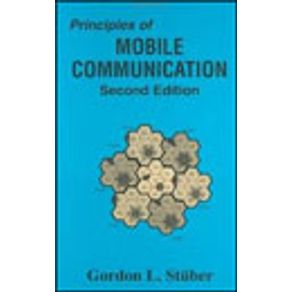Principles of Mobile Communication' Second Edition is an authoritative treatment of the fundamentals of mobile communications. The book stresses the "fundamentals" of wireless and mobile communications engineering important for the design of "any" wireless system. The book differs from others in the field by stressing mathematical modeling and analysis. It includes many detailed derivations from first principles, extensive literature references, and provides a level of depth that is necessary for graduate students wishing to pursue research on this topic. Its focus will benefit students taking formal instruction and practicing engineers who are likely to already have familiarity with the standards and are seeking to increase their knowledge of this important subject. Special features of this new edition: + New sections on block and turbo coding, CDMA soft handoff and power control (including analysis), MLSE co-channel demodulation and interference cancellation, and transmit diversity basics. + Updated discussion of cellular systems and standards, and spread spectrum, including spreading codes, signal power, and tone interference analysis. + New treatment of cellular link budget and capacity, orthogonal signaling and variants, linearized GMSK, and expansion of OFDM. + A new section on macrodiversity TDMA cellular architectures and expanded treatment of cluster planned hierarchical TDMA cellular architectures. + Additional coverage of radio propagation modeling to include base station reception, as well as a more detailed treatment of multipath-fading simulation models and techniques. + Numerous additional homework problems throughout, and much more. Principles of Mobile Communication, Second Edition has been specifically developed as a textbook for graduate-level instruction and as a reference book for practicing engineers. The book contains sufficient background material and literature references for the novice, yet enough advanced material for a comprehensive gradu


